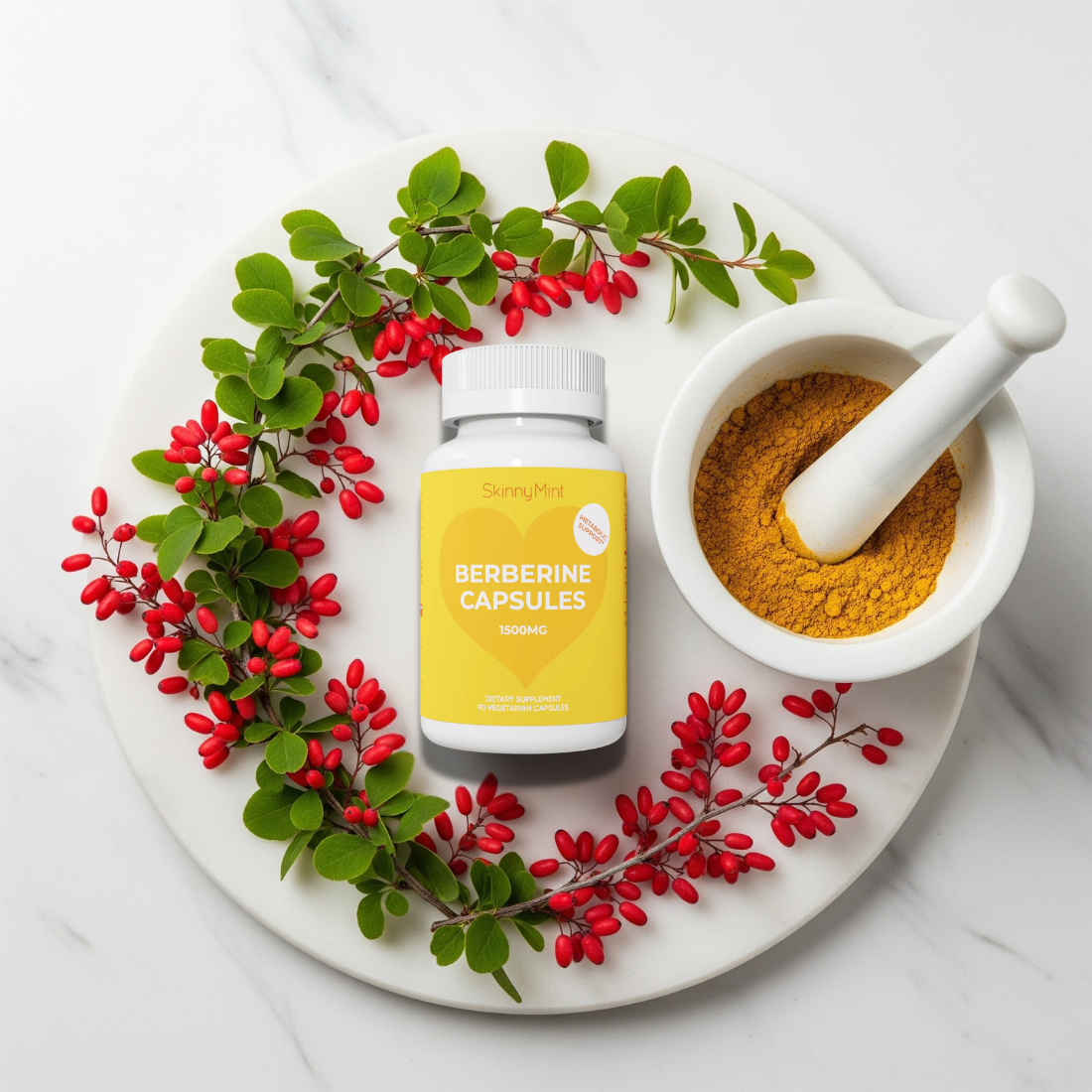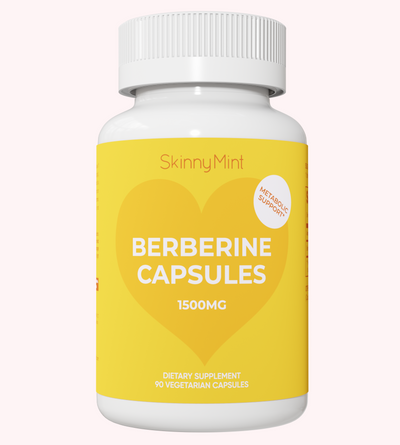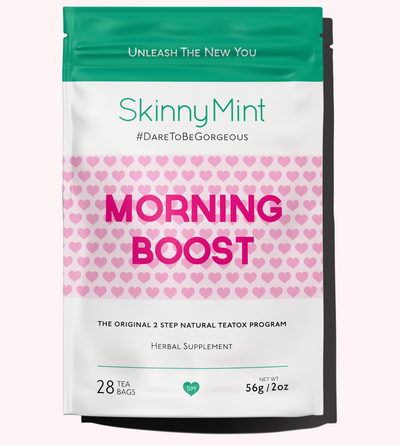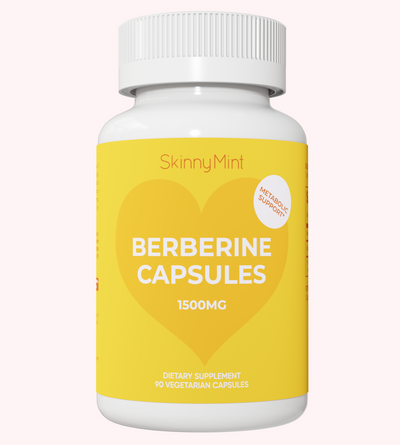
A potent plant-derived compound has recently exploded across social media, earning the catchy but highly misleading moniker "Nature's Ozempic." This compound is berberine, and while its viral fame is new, its history is ancient. For thousands of years, berberine has been a cornerstone of Traditional Chinese Medicine (TCM) and Ayurveda, used to treat a host of ailments from infections to digestive distress. Today, this yellow, bitter-tasting alkaloid is being scrutinized by modern science, not as a fleeting trend, but as a compound with tangible, multi-faceted effects on human metabolism.
The current buzz, however, creates a critical tension between an ancient remedy and the modern desire for a quick-fix weight loss solution. This comprehensive report aims to cut through the hype and provide a balanced, exhaustive, and evidence-based exploration of berberine. By analyzing the clinical data, we will deconstruct its true mechanisms, evaluate its benefits for metabolic health, and deliver a clear verdict on its comparison to pharmaceuticals. Most importantly, this guide will serve as a responsible resource, detailing the crucial safety considerations, side effects, and extensive drug interactions that anyone considering this supplement must understand.

Deconstructing Berberine - From Ancient Herb to Modern Supplement
To understand berberine's potential, one must first understand what it is—and what it is not. It is not a miracle herb, but a specific chemical compound with defined biological activity.
What is Berberine?
Berberine is a bioactive, yellow-colored, and bitter-tasting chemical compound classified as an isoquinoline alkaloid. It is not a plant itself but is extracted from the roots, rhizomes, and stem bark of various plants. The most common sources include:
-
European barberry (Berberis vulgaris)
-
Goldenseal (Hydrastis canadensis)
-
Goldthread (Coptis chinensis)
-
Oregon grape (Berberis aquifolium)
-
Phellodendron (Amur cork tree)
-
Tree Turmeric (Berberis aristata).
Its vibrant yellow color is so pronounced that it was historically used as a natural dye for materials like wool and leather. As a supplement, it is most commonly sold in capsule or tablet form.
Berberine vs. Turmeric: Clarifying a Common Confusion
A significant point of confusion for consumers is the relationship between berberine and turmeric. To be unequivocally clear: berberine and turmeric are not the same thing.
The source of this confusion is largely semantic. The popular spice turmeric comes from the root of the Curcuma longa plant, and its primary active compound is curcumin. Berberine, on the other hand, is a completely different compound found in a different family of plants. The mix-up arises because one of the primary plant sources of berberine is Berberis aristata, which is commonly known as "tree turmeric".
While both curcumin (from turmeric) and berberine (from plants like tree turmeric) are staples of traditional medicine and possess anti-inflammatory properties, their chemical structures, primary mechanisms of action, and specific health applications are distinct. Understanding this difference is the first step in appreciating what berberine can and cannot do.
A Legacy in Traditional Medicine
Berberine's current popularity in the West is a recent phenomenon, but its use is deeply rooted in ancient healing practices. For millennia, both Traditional Chinese Medicine and Ayurvedic medicine have utilized berberine-containing plants to treat a wide array of conditions. Its historical applications were primarily focused on its antimicrobial and anti-inflammatory properties, making it a go-to remedy for bacterial diarrhea, intestinal parasites, and other gastrointestinal infections. It was also used topically for skin infections and wound healing. This long history of therapeutic use provides the foundation for the modern scientific inquiry into its broader metabolic effects.
The Science Behind the Supplement: How Berberine Works
Unlike many targeted pharmaceutical drugs that affect a single biological pathway, berberine is pleiotropic, meaning it interacts with multiple targets within the body's cells. This multi-pronged approach is the key to understanding its wide range of observed benefits.
Activating the "Metabolic Master Switch": A Simple Guide to AMPK
The primary and most well-researched mechanism of berberine is its ability to activate an enzyme called AMP-activated protein kinase (AMPK). Often referred to as the body's "metabolic master switch," AMPK plays a central role in regulating cellular energy balance.
Think of AMPK as a sensor for the energy status of a cell. When cellular energy is low (a high AMP/ATP ratio), AMPK is activated. It then signals the cell to shift from an energy-storing (anabolic) state to an energy-burning (catabolic) state to generate more fuel. By activating AMPK, berberine effectively mimics the cellular effects of exercise and calorie restriction.
This activation triggers several crucial downstream effects related to metabolic health:
-
Increased Glucose Uptake: It encourages muscle and fat cells to pull more glucose out of the bloodstream to be used for energy, thereby lowering blood sugar levels.
-
Decreased Liver Glucose Production: It reduces the amount of new glucose produced by the liver (a process called gluconeogenesis), which further helps control blood sugar.
-
Improved Insulin Sensitivity: By helping cells use glucose more efficiently, it reduces the body's need for high levels of insulin, thus improving insulin sensitivity.

Beyond the Switch: A Multi-Target Approach
While AMPK activation is central, it is not the whole story. Berberine's broad influence stems from its ability to nudge several interconnected systems at once.
-
Gut Microbiome Modulation: A growing body of evidence shows that berberine can significantly alter the composition of the gut microbiome. It appears to have antimicrobial properties that suppress the growth of certain harmful bacteria while promoting the growth of beneficial species, such as those that produce short-chain fatty acids like butyrate. A healthier gut environment is linked to reduced systemic inflammation and improved overall metabolic function.
-
Slowing Carbohydrate Digestion: Berberine can inhibit certain enzymes in the gut that are responsible for breaking down complex carbohydrates into simple sugars. By slowing this process, it helps prevent the sharp, rapid spikes in blood sugar that often occur after a carb-heavy meal.
-
Modulating Gene Expression: At a fundamental level, berberine may influence which genes are turned on or off. Some research suggests it can help "switch off" genes involved in fat storage and cholesterol absorption, further contributing to its positive metabolic effects.
This multi-target action explains how a single compound can demonstrate benefits for such a wide range of conditions, from type 2 diabetes to high cholesterol and PCOS. It also explains why its effects can be less predictable than a pharmaceutical designed for a single purpose, a fact that underscores the need for cautious use and further research.
The "Nature's Ozempic" Verdict: Berberine and Weight Loss
The comparison of berberine to Ozempic is what catapulted it into the social media spotlight. However, a scientific analysis of their mechanisms and clinical trial results reveals this comparison to be fundamentally flawed.
Head-to-Head: Berberine vs. Ozempic (Semaglutide)
The two compounds achieve their effects through entirely different biological pathways.
-
Ozempic (Semaglutide): Belongs to a class of drugs called glucagon-like peptide-1 (GLP-1) receptor agonists. It works by directly mimicking the action of the natural hormone GLP-1, which is released in the gut after eating. This mimicry has three powerful effects: it signals the brain to suppress appetite, it slows down the rate at which the stomach empties (prolonging feelings of fullness), and it stimulates insulin release in response to high blood sugar. Its impact on weight loss is direct and potent.
-
Berberine: As established, berberine is primarily an AMPK activator. Its effect on weight is an indirect consequence of improved metabolic function—better insulin sensitivity and more efficient glucose utilization. While some animal studies suggest berberine might have a minor, secondary influence on GLP-1, this effect is weak and has not been conclusively demonstrated in human trials. It does not function as a powerful appetite suppressant in the way that semaglutide does.
Analyzing the Evidence: How Much Weight Can You Realistically Lose?
The clinical data on weight loss efficacy highlights the dramatic difference between the two.
-
Ozempic/Semaglutide: Large-scale, rigorous clinical trials have demonstrated substantial weight loss. On average, participants taking semaglutide lose approximately 15% of their total body weight over about a year. For a 200-pound individual, this translates to a loss of 30 pounds.
-
Berberine: The research on berberine for weight loss consists of smaller, often lower-quality studies. A meta-analysis of these trials found that berberine supplementation resulted in a modest weight loss of, on average, 4 to 5 pounds over a period of several months. While statistically significant, this effect is minimal compared to the results seen with semaglutide.
This stark contrast in results is not surprising given their different mechanisms. The "Nature's Ozempic" narrative is a powerful example of how marketing and public desire can outpace scientific reality. The trend is fueled by the high cost, potential side effects, and prescription-only status of drugs like Ozempic, creating a market vacuum for a cheaper, "natural" alternative. Berberine, being inexpensive and widely available, fits this role perfectly, even if its effects are not comparable.
The Timeline for Results: Patience is a Virtue
Unlike a potent pharmaceutical, berberine is not a quick fix. The metabolic changes it induces take time to manifest. Most studies indicate that consistent supplementation is required for at least 8 to 12 weeks before noticeable results in weight or metabolic markers are observed. This effect is almost always noted in the context of simultaneous lifestyle changes, such as improved diet and regular exercise.
Debunking the Myth of Spot Reduction: Can Berberine Target Belly Fat?
A common claim is that berberine can specifically reduce belly fat. This is a misunderstanding of how weight loss works. No pill or supplement, including berberine, can target fat loss from a specific area of the body. Weight loss is a systemic process. While some studies have reported that berberine supplementation leads to a reduction in waist circumference, this is a result of overall body weight and fat reduction, not a targeted "belly fat burning" effect.
The Clinically-Observed Health Benefits of Berberine
While berberine may be a disappointing alternative for those seeking dramatic weight loss, its true clinical potential lies in its well-documented ability to support overall metabolic health. The scientific evidence for these benefits is far more robust.
A Powerful Ally for Blood Sugar Control and Insulin Sensitivity
This is arguably berberine's most significant and well-supported application. Multiple studies and meta-analyses have shown that berberine can substantially lower key markers of blood sugar control in individuals with type 2 diabetes. It has been found to:
-
Significantly reduce fasting blood glucose levels by up to 20%.
-
Lower hemoglobin A1c (HbA1c), a measure of long-term blood sugar regulation, by up to 12%.
In fact, some systematic reviews have concluded that berberine's efficacy in lowering blood sugar is comparable to that of common oral diabetes medications like metformin. However, it is crucial to state that berberine is not a substitute for prescribed diabetes medication and should only be considered as a supportive, or adjunct, therapy under the guidance of a healthcare provider.
Supporting Cardiovascular Health: Cholesterol and Triglycerides
Berberine has demonstrated impressive effects on blood lipid profiles, which are key risk factors for cardiovascular disease. Research indicates that supplementation can lead to favorable changes in cholesterol and triglycerides, including:
-
Lowering "bad" LDL cholesterol and total cholesterol.
-
Lowering blood triglycerides.
-
Raising "good" HDL cholesterol.
An international panel of lipid experts has suggested that berberine may be a particularly useful option for patients with mild to moderately high cholesterol who cannot tolerate statin drugs or for those with metabolic syndrome.
A Promising Aid for Hormonal Health and PCOS
One of the most compelling use cases for berberine is in the management of Polycystic Ovary Syndrome (PCOS), a common hormonal disorder in women that is strongly linked to insulin resistance. By addressing the underlying metabolic dysfunction, berberine can help alleviate several hallmark symptoms of PCOS. Studies have shown that it can:
-
Improve insulin sensitivity and lower fasting insulin levels.
-
Reduce circulating levels of androgens (male hormones) like testosterone, which can help with symptoms like hirsutism (excess hair growth) and acne.
-
Decrease waist-to-hip ratio and visceral fat.
-
Potentially improve ovulation rates and menstrual cycle regularity, which may support fertility.
For many women with PCOS, berberine offers a multi-faceted approach that targets the root metabolic issues of the condition.
Potential for Improving Liver and Digestive Wellness
Contrary to concerns that supplements can be hard on the liver, berberine has generally been found to be safe for the liver and has not been linked to liver injury in the vast majority of studies.
In fact, the evidence suggests berberine may actually improve liver health. It has shown particular promise in treating non-alcoholic fatty liver disease (NAFLD), a condition characterized by fat accumulation in the liver. Studies have found that berberine can help reduce this hepatic fat and improve liver enzyme levels. This benefit is likely tied to its broader effects on improving insulin sensitivity and lipid metabolism. While generally safe, it's important to note that rare cases of liver issues have been reported, usually in the context of high doses or interactions with other substances.
A High-Quality Choice: Introducing SkinnyMint Berberine
Navigating the supplement market can be challenging. Because the industry is not regulated by the FDA, the quality, purity, and dosage of products can vary dramatically. This makes choosing a trustworthy brand paramount. For those who have reviewed the evidence and consulted with a healthcare provider, the(https://us.skinnymint.com/products/berberine-weight-loss-capsules) supplement represents a high-quality, evidence-aligned option.
Product Spotlight
The SkinnyMint product stands out for two key reasons: its dosage and its purity.
-
Clinically Relevant Dosage: It provides 1500mg of berberine per serving. This dosage is critical because numerous successful clinical trials that demonstrated significant benefits for blood sugar, cholesterol, and weight management used dosages in the 1000mg to 1500mg per day range. Many other products on the market are underdosed, which may not deliver the effects observed in research.
-
Clean and Simple Formula: The ingredient list is straightforward: Berberine, Vegetable Cellulose (for the capsule), and Rice Flour. This lack of unnecessary fillers or additives appeals to health-conscious consumers seeking a pure and potent product.

Connecting Claims to Evidence
SkinnyMint's claims for its berberine supplement are directly supported by the body of scientific evidence discussed throughout this report:
-
"Regulates cholesterol, sugar, and supports liver health": This aligns perfectly with the robust data showing berberine's ability to lower LDL cholesterol and triglycerides, significantly improve blood sugar control and HbA1c, and reduce fat in the liver in cases of NAFLD.
-
"Boosts metabolism & PCOS Support": This is supported by berberine's primary mechanism of activating AMPK, the body's metabolic master switch, and the strong clinical evidence for its use in improving the metabolic and hormonal markers of PCOS.
-
"Supports gut health": This reflects the research on berberine's ability to positively modulate the gut microbiome, fostering a healthier balance of bacteria.
For individuals seeking a supplement that matches the specifications used in scientific research, exploring a high-quality, clinically-dosed berberine supplement is the logical next step.
A Critical Guide to Safety: Side Effects and Contraindications
Berberine is a biologically active compound with real effects, which means it also comes with real risks and potential side effects. Understanding these is non-negotiable for safe use.
Navigating Common Side Effects
The vast majority of side effects associated with berberine are gastrointestinal in nature. They are typically mild to moderate and may include:
-
Diarrhea
-
Constipation
-
Gas and bloating
-
Stomach pain or discomfort.
These side effects are often dose-dependent. A practical strategy to minimize them is to start with a lower dose (e.g., 500mg once a day) and gradually increase to the desired amount over several days. Taking the supplement with a meal can also help reduce the likelihood of stomach upset.
Who MUST Avoid Berberine: A Non-Negotiable Safety Warning
For certain populations, berberine is considered unsafe and should be avoided entirely. These are absolute contraindications.
-
Pregnant and Breastfeeding Women: This is the most critical warning. Berberine can cross the placenta and may cause harm to the developing fetus. It can also be transferred to an infant through breast milk. Specifically, exposure to berberine has been linked to a dangerous condition in newborns called kernicterus, a type of brain damage caused by a buildup of bilirubin in the blood.
-
Infants and Children: For the same reason, berberine should never be given to infants or young children due to the risk of kernicterus.
-
Individuals with Severe Chronic Kidney Disease: While berberine appears safe for those with healthy kidneys or early-stage kidney disease, individuals with severe chronic kidney disease (especially those on dialysis) should avoid it. Impaired kidney function can affect the body's ability to clear substances, potentially leading to unsafe accumulation.
The Wild West of Supplements: Why Quality Matters
It is essential to remember that in the United States, dietary supplements are not regulated by the Food and Drug Administration (FDA) for safety, purity, or efficacy before they hit the market. This lack of oversight creates a "buyer beware" environment. Studies have found that the actual amount of berberine in a supplement bottle can vary wildly from what is stated on the label, and some products may even contain harmful contaminants.
This reality underscores the critical importance of choosing a reputable brand that commits to third-party testing for purity and potency. This ensures that the product contains what it claims to contain and is free from contaminants, which is the foundation of safe supplementation.
The Drug Interaction Minefield: A Crucial Warning
Berberine's potential to interact with prescription medications is significant and represents one of the greatest risks associated with its use. This is not an arbitrary risk but a predictable biochemical event.
Explaining the "Why": Berberine's Effect on Liver Enzymes
The liver is the body's primary detoxification organ. It uses a family of enzymes known as the Cytochrome P450 (CYP450) system to metabolize and clear the vast majority of drugs from the bloodstream.
Berberine has been shown to be a potent inhibitor of several of these key enzymes, particularly CYP2D6, CYP2C9, and CYP3A4. When berberine inhibits these enzymes, it slows down the liver's ability to break down other drugs that rely on the same pathways. As a result, the levels of these other drugs can build up in the blood, sometimes to dangerous or toxic concentrations, dramatically increasing their effects and the risk of severe side effects.
A Comprehensive Table of Known Drug Interactions
Because so many common medications are metabolized by these enzymes, the list of potential interactions is extensive. The following table summarizes some of the most critical ones. This list is not exhaustive.
The Golden Rule: Mandatory Consultation
The takeaway from this section is simple and absolute: If you take ANY prescription medication, you MUST speak with your doctor or pharmacist before considering berberine. They can review your specific medications and assess the potential risk of a harmful interaction.
A Practical User's Manual for Berberine
For those who have determined with their healthcare provider that berberine is a safe and appropriate option, following practical guidelines can help optimize its benefits.
Optimal Dosage and Timing
The dosage most frequently used in clinical studies that showed positive results is 1000mg to 1500mg per day. This is typically split into two or three separate doses of 500mg each, taken throughout the day. This is because berberine has a relatively short half-life in the body, so splitting the dose helps maintain more stable levels in the bloodstream.
Regarding timing, the general consensus is to take berberine with or just before a meal. This practice can help enhance its absorption and is also effective at minimizing the potential for gastrointestinal side effects.
Answering Niche Questions: Berberine and Vitamin D
A common question is whether berberine can be taken with other supplements, such as Vitamin D. The answer is yes, and there may even be a synergistic relationship. Research suggests that berberine can enhance the activity of the Vitamin D receptor (VDR) in intestinal cells, which is crucial for gut barrier function. Furthermore, one clinical trial in postmenopausal women found that a combination supplement containing berberine, Vitamin D3, and Vitamin K1 produced a more favorable profile of bone turnover markers compared to a placebo, suggesting a potential benefit for bone health.
Considerations for Long-Term Supplementation
A key limitation in the current body of research is the lack of data on the safety and effects of long-term, continuous berberine use. Most studies have lasted for a period of three to six months. Due to this uncertainty, some functional and integrative medicine practitioners recommend "cycling" the supplement. This might involve taking it consistently for a period, such as three months, and then taking a break for a few weeks to assess its effects and give the body a rest.
Conclusion: The Final, Balanced Verdict on Berberine
Berberine is a fascinating and potent compound, a bridge between ancient herbal wisdom and modern metabolic science. After an exhaustive review of the evidence, a clear picture emerges.
Berberine's identity has been temporarily hijacked by the "Nature's Ozempic" trend, a label that sets up unrealistic expectations and obscures its true value. Its effects on weight loss are modest at best, indirect, and in no way comparable to the powerful pharmaceutical action of GLP-1 agonists.
Its real strength, supported by a growing body of clinical evidence, lies in its role as a powerful tool for supporting overall metabolic health. By activating the master metabolic switch, AMPK, it offers significant, clinically-validated benefits for individuals struggling with the interconnected issues of metabolic syndrome. It is a formidable ally for:
-
Blood Sugar Control and Insulin Resistance.
-
Improving Cholesterol and Triglyceride Levels.
-
Managing the Metabolic and Hormonal Aspects of PCOS.
However, its power demands respect and caution. It is not a magic pill or a standalone cure. The most responsible way to view berberine is as a potential adjunct therapy or a supportive tool to be used within a comprehensive health strategy that must include a balanced diet, regular exercise, and, most importantly, professional medical supervision.
Given the lack of FDA regulation and the extensive potential for serious drug interactions, the final, unambiguous recommendation is this: consult a qualified healthcare provider before starting berberine. They are the only ones who can safely determine if this ancient compound has a place in your modern health journey. For those who receive that green light, choosing a product from a trusted source like(https://skinnymint.com) is the essential final step to ensuring safety and efficacy.






